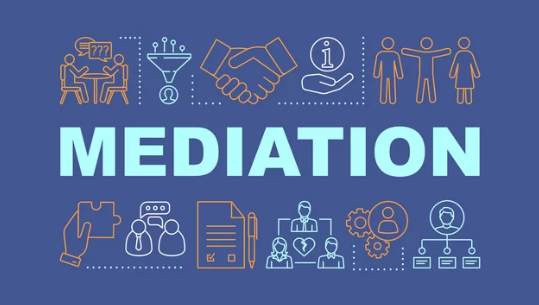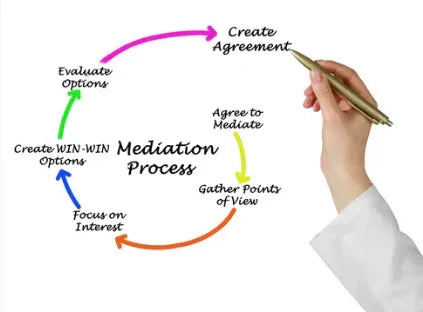
WHAT IS MEDIATION?
Mediation is a method of dispute resolution where an impartial third party (the mediator) helps conflicting parties reach a mutually agreeable solution.
It's a lot faster, less expensive, and less adversarial than going to court.
REASONS FOR MEDIATION
Collapsible content
PROJECT IS BEHIND
All builders should follow an agreed schedule of works and adhere to it, except in exceptional circumstances such as adverse weather or supplier delays. These situations are typically manageable. However, if delays are caused by issues within the building company itself, it is unreasonable for those setbacks to be passed on to you as the client.
COSTS SPIRALLING OUT OF CONTROL
Most tradespeople provide a quote along with a standard allowance—typically 5–10%—to cover unforeseen costs. While some variation is normal in the industry, frequent add-ons or a significant increase in the total cost can be a valid reason to initiate mediation. This helps prevent spiralling expenses and ensures you fully understand the reasons behind any additional charges.
THE QUALITY OF WORK
In most cases, people invest their life savings into home improvements—an investment not just in property, but in their family’s future. When spending a life-changing amount of money, it’s only reasonable to expect high-quality workmanship.
If at any point you feel the standard of work falls short or you're being met with excuses, we can assess the work and engage with the contractor to address your concerns. Mediation can help ensure that the work meets or exceeds the expected standards, providing better value and longer-term durability.
HARRASSMENT OR THREATING BEHAVIOUR
Unfortunately, we’re seeing an increasing number of situations where tradespeople come across as rude, aggressive, or even threatening. In many cases, this is simply the result of language or cultural differences.
We can step in as a neutral third party to help bridge those gaps, reduce misunderstandings, and create a more harmonious environment for both sides.
UNACCEPTABLE WORKING TIMES
Sometimes, tradespeople may impose unreasonable working hours and pressure you to accept them. While we encourage cooperation with your contractor where possible, we understand it can be difficult to communicate your concerns effectively. Most local councils permit noisy work between 8:00 AM and 6:00 PM, Monday to Friday, and from 8:00 AM to 1:00 PM on Saturdays
DIS-TRUST OR BREAKING PROMISES
Trust plays a crucial role in this industry. In many cases, you're placing tens of thousands of pounds—and your family home—in the hands of someone you’ve only just met. If a tradesperson begins to show signs of dishonesty or unreliability, we strongly recommend mediation before the situation escalates. Early intervention can help restore communication, regulate the project, and keep things on track moving forward.
UNREASONABLE REQUESTS
If your builder begins making repeated unreasonable requests, it’s often a sign that something is going wrong behind the scenes. Acting quickly through mediation can help prevent financial loss and stop the project from deteriorating further.
As part of the process, we listen to the concerns of both parties and work to develop practical solutions that benefit everyone involved.
THE MEDIATION PROCESS
-

AGREE TO MEDIATE
For mediation to be effective, both parties must agree to participate.
We can approach the other party on your behalf, or you may choose to seek their agreement before appointing us as your mediator.
-

GATHER POINTS OF VIEW
Mediation is necessary when two or more parties have differing accounts or expectations.
Understanding each perspective is essential to finding a path forward to resolve both parties problems.
-

FOCUS ON THE WIN-WIN
There is often common ground or a win-win solution that may not be immediately visible to the parties involved. As mediators, we are committed to uncovering and facilitating that resolution.
-

EVALUATE OPTIONS
It’s important that both parties are given the time to fully evaluate the solutions we propose & only agree when they are confident the outcome meets their expectations — not simply to just reach an agreement.
-

SIGN AGREEMENTS
Once both parties have agreed to the terms, we will prepare a contract variation for both sides to sign, formally documenting the agreement to provide clarity & protection in the event of any future legal action.
TYPES OF MEDIATION WE OFFER

REMOTE MEDIATION
We provide our mediation services remotely—via email, phone, or Zoom—which often proves faster and more convenient for all parties. In most cases, this approach delivers the same effective results as in-person mediation.
When terms are fully agreed upon, we will prepare a formal contract variation for both parties to sign—ensuring the agreement is clearly documented and offers protection in the event of any future legal action.

IN-PERSON MEDIATION
We begin by meeting with both parties independently to understand their perspectives and conduct a fair, balanced evaluation. If necessary, we can arrange a joint mediation conference to work toward a resolution.
Following our assessment, we will present both parties with a set of proposed options to review and consider. Once an agreement is reached, we will draft the necessary documentation for both parties to review and sign.
When terms are fully agreed upon, we will prepare a formal contract variation for both parties to sign—ensuring the agreement is clearly documented and offers protection in the event of any future legal action.

BEFORE COURT PREPERATION
If mediation is unsuccessful or you decide to take your tradesperson to court, compiling the necessary documentation can be time-consuming—and if done incorrectly, it may weaken your case or result in an unfavorable outcome.
We can handle the preparation of all essential materials, including photographs, evidence, and independent evaluations, to ensure your claim is strong and well-organized. In many cases, a properly prepared case file can even resolve the issue without the need to proceed to court.
(Does not include court fee)
MEDIATION SERVICES
Share







